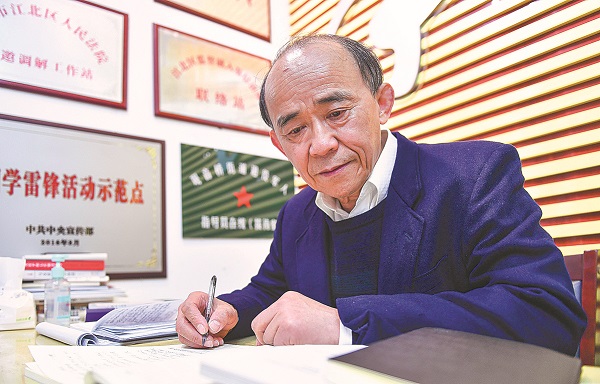NPC deputy diligent in dispelling disputes

Ma Shanxiang works at his office in Chongqing. [Photo provided to CHINA DAILY]
Ma Shanxiang has witnessed Chongqing's development by serving as a mediator in a neighborhood office for nearly half his life.
He has helped settle more than 2,000 disputes, and his work notes, containing over 9 million words, serve as a systematic work guide for mediators nationwide.
Over the years, he has garnered multiple honors, including being named a "role model of the times" by the Publicity Department of the Central Committee of the Communist Party of China in 2014. Four years ago, he became a deputy to the National People's Congress, the top legislature.
Ma, 66, was born in Longchang, Sichuan province. He served in the army, and after he left he began working at the judicial bureau of Chongqing's Jiangbei district. It was around this time in 1988 that he was introduced to mediation work.
In 1995, he started working as a deputy director in Guanyinqiao neighborhood office in the district. Guanyinqiao Street runs through Jiangbei. One of the city's most developed and densely populated districts, the district is home to over 450,000 residents. Neighborhood residents have a saying: "Go to Lao Ma if you need anything."
Known for his vigor and broad smile, Ma's success at resolving the most difficult disputes earned him a good reputation among residents.
In May 2012, Lao Ma Studio was established in the neighborhood office. Serving as the chief mediator, Ma and his team mediate disputes in 22 communities in Guanyinqiao, and offer mediation guidance in over 180 communities in the whole district.
Ma is also often invited to participate in mediation at local courts. "The Chinese are receptive to solving problems through negotiation," he said.
The People's Mediation Law was implemented in the country on Jan 1, 2011. It defines mediation as a mechanism for two quarreling parties to reach an agreement on the basis of equal negotiation and free will via a people's mediation committee. "There is no absolute solution to a conflict, as people's reactions to conflicts vary. But most people are willing to resolve disputes reasonably and legally," Ma said.
In one case, families in Jiangbei's Jiujie neighborhood were asked to sell their homes to make way for a new mansion. After eight months of negotiation with Ma and his team, 220 families finally agreed to the terms. Sometimes, negotiations become heated during the mediation. In those cases, it's important that mediators act quickly to ease tensions, put themselves in the parties' shoes and rebuild confidence in the participants, he said.
"Disputes have changed a lot over the years," said Ma, noting that years ago, conflicts were much more intense and largely centered on financial matters such as land and housing acquisition, enterprise restructuring and environmental relocation. "As people are getting richer, the conflicts have eased and now mainly concern issues related to the quality of life," he said.



